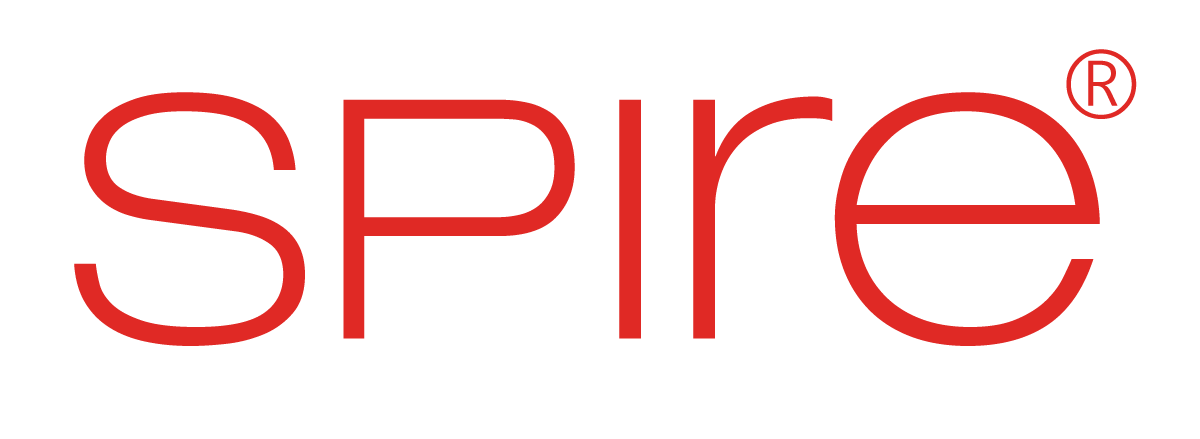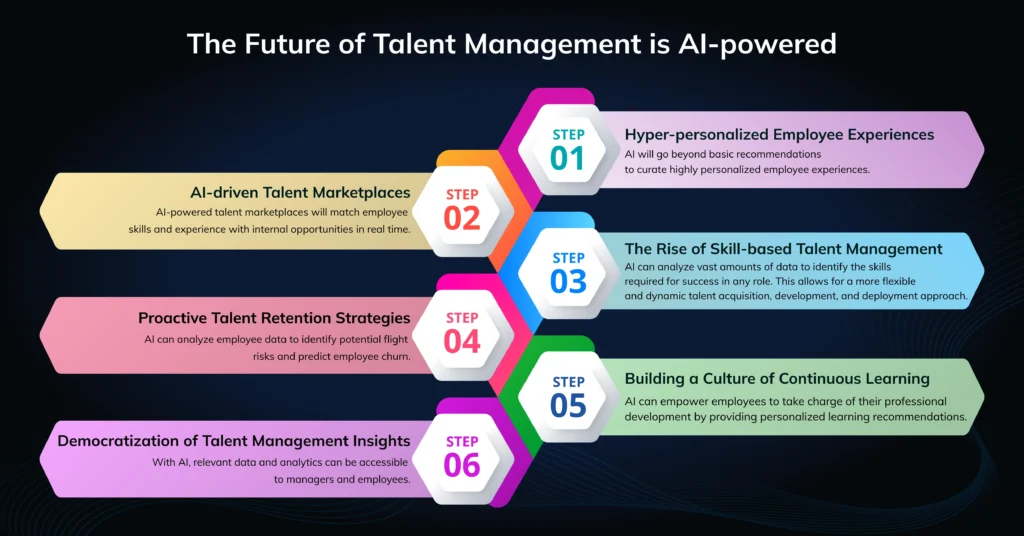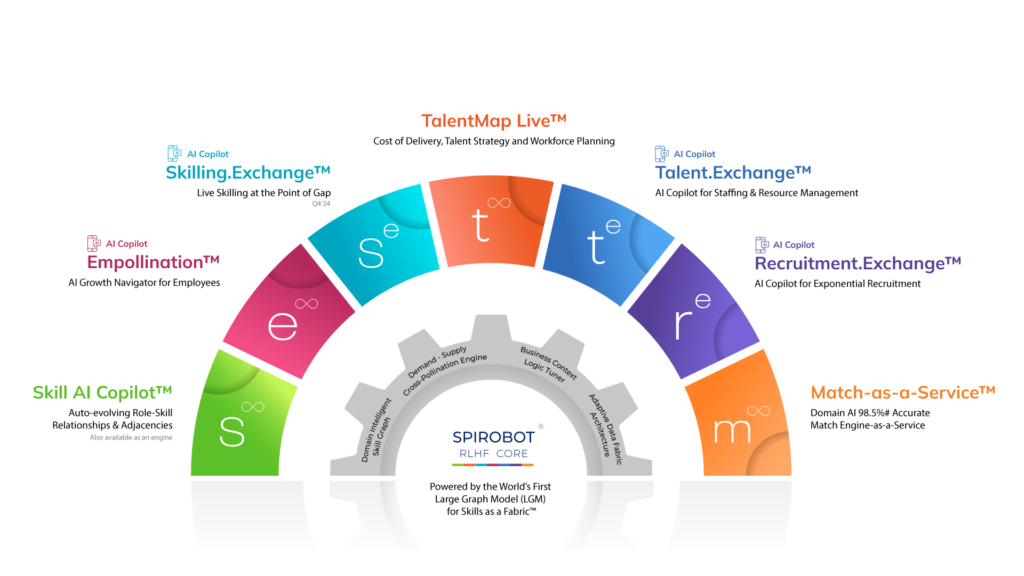The Great Resignation, the Skills Gap, the War for Talent—no matter what you call it, the reality is apparent: attracting, developing, and retaining top talent is more challenging than ever. In today’s competitive business landscape, organizations constantly grapple with a rapidly evolving job market and a growing skills gap. Traditional talent management methods, reliant on spreadsheets and gut instinct, are simply falling short.
This is where talent management technology (TMS) powered by Artificial Intelligence (AI) steps in. TMS is a digital command center for your most valuable asset – your people. These talent management systems streamline and centralize all your talent management processes, from recruitment and onboarding to performance management and succession planning. But with the integration of AI, these systems become even more powerful, offering a data-driven and personalized approach to talent management.
Let’s explore the role of AI in talent management systems and how your organization can benefit from it. But before that, let’s understand the concept of talent management and talent management systems.
What is a Talent Management System (TMS)?
A talent management system (TMS) is a software solution that streamlines and centralizes all your talent management processes. These processes include everything from recruitment and onboarding to performance management and succession planning. By leveraging AI, these systems can become even more powerful, offering a data-driven approach to talent management.
The Importance of Talent Management in Skill-Based Organizations
A company’s success hinges on its workforce’s skills and abilities in today’s knowledge economy. Skill-based organizations recognize this and prioritize building a talent pool with the right mix of expertise to achieve their strategic goals. This shift from traditional job descriptions and focusing on specific skills requires a robust talent management strategy. Here’s why:
The Importance of Talent Management in Skill-Based Organizations
– Identifying and Attracting the Right Talent
– Developing a Future-Proof Workforce
– Optimizing Performance Management
– Promoting Internal Mobility and Growth
- Identifying and Attracting the Right Talent: Talent management systems with AI capabilities can analyze vast amounts of data to identify the specific skills needed for success in different roles. This allows skill-based organizations to target their recruitment efforts towards candidates with the most relevant skill sets, ensuring a strong talent pool from the very beginning.
- Developing a Future-Proof Workforce: The business landscape constantly evolves, and the skills required for success are changing rapidly. Talent management systems help skill-based organizations identify the necessary skills for every role and develop targeted training programs to upskill and reskill their workforce. This ensures they have the talent to stay ahead of the curve and adapt to changing market demands.
- Optimizing Performance Management: Skill-based talent management goes beyond just hiring the right people. It’s about enabling them to perform at their best. AI-powered talent management systems can track employee skill development, measure performance against specific skills, and provide personalized feedback and coaching opportunities. This empowers employees to continuously improve their skill sets and contribute more effectively to the organization’s goals.
- Promoting Internal Mobility and Growth: Employees with diverse skills are precious in a skill-based environment. Talent management systems can help identify and match employees with transferable skills with internal growth opportunities. This improves employee engagement and satisfaction and reduces costs associated with external recruitment.
How AI is Revolutionizing Talent Management
AI is transforming talent management by injecting intelligence and automation into every stage of the employee lifecycle. Here’s a deeper dive into how AI is revolutionizing this critical function:
A deeper dive into how AI is revolutionizing talent management:
– Supercharged Recruitment
– Identifying Skill Gaps with Precision
– Personalized Learning and Development
– Engaging and Retaining Top Talent
– Predictive Talent Analytics
– Building a Fairer Talent Management Process
- Supercharged Recruitment: AI can automate resume screening tasks like keyword matching and initial candidate filtering. This frees up recruiters’ time to focus on high-potential candidates and conduct in-depth interviews. Additionally, AI can analyze job descriptions and candidate profiles to ensure a perfect skills match, leading to a higher quality of hire.
- Identifying Skill Gaps with Precision: AI can analyze vast amounts of employee data, including resumes, performance reviews, and internal project information, to identify skill gaps and redundancies within the workforce. This allows organizations to develop targeted training programs and upskilling initiatives to bridge those gaps and ensure their workforce stays ahead of the curve.
- Personalized Learning and Development: AI can analyze employee skills and performance data to recommend personalized learning paths and development opportunities. This ensures that employees continuously develop the skills they need to succeed in their current roles and prepare for future organizational opportunities.
- Engaging and Retaining Top Talent: AI-powered talent management systems can help improve employee engagement and satisfaction by personalizing the employee experience and providing growth opportunities. This translates to a more motivated workforce and reduced turnover, leading to significant cost savings for the organization.
- Predictive Talent Analytics: AI can analyze historical data and identify patterns to predict employee performance, flight risk, and high-potential candidates. This allows organizations to proactively address potential issues and develop targeted retention strategies for their most valuable employees.
- Building a Fairer Talent Management Process: AI can help remove unconscious bias from the talent management process. By analyzing skills and qualifications objectively, AI can ensure that all candidates and employees are evaluated fairly and on a level playing field.
These are just a few examples of how AI is revolutionizing talent management. As AI technology evolves, we can expect even more innovative applications that fundamentally reshape how organizations manage their workforce.
Spire.AI Solutions: Empowering Organizations with AI-Based Talent Management
Spire.AI is a leading AI-powered talent management solution. Our comprehensive suite of tools helps organizations optimize every aspect of the talent lifecycle, from attracting top talent to developing future leaders. Here’s a glimpse into how Spire.AI empowers organizations:
- Auto-Evolving Role-Skill Framework: This framework uses AI and Large Graph Models (LGM) to identify complex skill requirements for every role automatically. This ensures your talent management systems can access the most up-to-date skills data for accurate analysis and decision-making.
- Talent Management for Skills-Based Organizations: Spire.AI leverages AI to aggregate and understand data from various sources, creating AI-generated employee skill profiles. This allows for targeted development opportunities and a more data-driven approach to talent management.
- Career Path Simulation and Reskilling Recommendations: Spire.AI uses AI to recommend personalized career paths and reskilling opportunities for employees. This empowers individuals to take charge of their careers while ensuring their skills align with the organization’s strategic goals.
- Talent Marketplace: Spire.AI’s Talent Marketplace is an AI-powered platform that facilitates internal mobility. It helps match employee skills with open positions, promoting internal growth and development opportunities. This has led to a significant increase in internal hiring from 21% to 56% for organizations using Spire.AI.
- Talent Acquisition: Spire.AI’s AI-powered tools can help recruiters source top talent more efficiently. By automatically screening resumes and identifying the best matches, they can reduce cost per hire by up to 70% and ensure a 35% match-to-offer ratio.
The Future of Talent Management is AI-powered
The future of talent management is undeniably AI-powered. As AI technology develops and becomes more sophisticated, we expect to see even more transformative applications that reshape how organizations manage their human capital. Here’s a glimpse into what the future holds:
- Hyper-personalized Employee Experiences: AI will go beyond basic recommendations to curate highly personalized employee experiences. Imagine a world where AI proactively suggests learning paths, career development opportunities, and internal job postings based on an employee’s real-time performance data, skill assessments, and personal career aspirations. This level of personalization will foster a culture of continuous learning and growth, keeping employees engaged and motivated.
- AI-driven Talent Marketplaces: AI-powered talent marketplaces will revolutionize internal talent mobility. These platforms will leverage AI to match employee skills and experience with internal opportunities in real-time. This will create a more efficient way to fill open positions and empower employees to take ownership of their careers by proactively seeking growth opportunities within the organization.
- The Rise of Skill-based Talent Management: With AI, organizations can move beyond traditional job descriptions and embrace a more skills-based approach to talent management. AI can analyze vast amounts of data to identify the skills required for success in any role. This allows for a more flexible and dynamic talent acquisition, development, and deployment approach. Additionally, AI can help assess an individual’s current skill set and identify growth potential, enabling the creation of personalized learning pathways that bridge skill gaps and prepare employees for future opportunities.
- Proactive Talent Retention Strategies: AI will play a crucial role in developing proactive talent retention strategies. AI can identify potential flight risks and predict employee churn by analyzing employee data. This allows organizations to intervene early on, address employee concerns, and develop targeted retention initiatives to keep their top talent engaged and motivated.
- Building a Culture of Continuous Learning: AI-powered talent management systems will foster a culture of continuous learning within organizations. By providing personalized learning recommendations and micro-learning opportunities tailored to individual needs, AI can empower employees to take charge of their professional development. This benefits the employee and ensures the organization has a future-proof workforce with the skills and expertise needed to stay competitive.
- Democratization of Talent Management Insights: AI will democratize access to talent management insights. Traditionally, these insights were siloed within HR departments. However, with AI, relevant data and analytics can be accessible to managers and employees. This empowers managers to make data-driven decisions about their teams and allows employees to track their progress and identify areas for improvement.
The future of talent management is bright, and AI is at the forefront of this transformation. By embracing AI-powered solutions, organizations can unlock the full potential of their workforce, create a more engaging and rewarding employee experience, and gain a significant competitive edge in the war for talent.
Final Thoughts
AI isn’t here to replace HR professionals but to empower them. By automating tedious tasks and providing data-driven insights for talent management, AI frees HR teams and business partners to focus on strategic initiatives and build strong relationships with employees. Imagine recruiters who can spend less time screening resumes and more time interviewing high-potential candidates. Picture managers who have real-time data on employee skills and performance, enabling them to provide personalized coaching and development opportunities.
The benefits of AI-powered talent management extend far beyond the HR department. A more engaged and skilled workforce leads to increased productivity, innovation, and customer satisfaction. By embracing AI, you’re not just investing in technology; you’re investing in your organization’s future.
Don’t be left behind in the AI revolution. Explore how AI-powered talent management solutions can transform your organization. Empower your people, unlock their potential, and gain a competitive edge in the war for talent. The future of work is intelligent, and the time to act is now.
Frequently Asked Questions
What is the talent management system?
A talent management system (TMS) is a software solution that streamlines and centralizes all your talent management processes including everything from recruitment and onboarding to performance management and succession planning.
What are the core functions of talent management?
Core functions of talent management include attracting, developing, engaging, and retaining top talent to achieve organizational goals.







